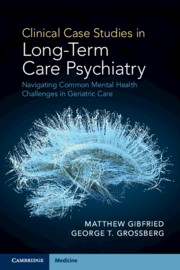 Clinical Case Studies in Long-Term Care Psychiatry
Clinical Case Studies in Long-Term Care Psychiatry Pseudobulbar Affect
Published online by Cambridge University Press: 31 October 2024
Pseudobulbar affect is described as episodes of involuntary, unprovoked, and sudden episodes of crying or laughing that happen as a result of central nervous system pathology. Pseudobulbar affect can be easily overlooked or misdiagnosed as a primary mood disorder. Several classes of medications have been used to treat it with varying success. These include SSRIs, SNRIs, and tricyclic antidepressants. Dextromethorphan/quinidine (Nuedexta) was approved in 2010 for the treatment of pseudobulbar affect.
To save this book to your Kindle, first ensure no-reply@cambridge.org is added to your Approved Personal Document E-mail List under your Personal Document Settings on the Manage Your Content and Devices page of your Amazon account. Then enter the ‘name’ part of your Kindle email address below. Find out more about saving to your Kindle.
Note you can select to save to either the @free.kindle.com or @kindle.com variations. ‘@free.kindle.com’ emails are free but can only be saved to your device when it is connected to wi-fi. ‘@kindle.com’ emails can be delivered even when you are not connected to wi-fi, but note that service fees apply.
Find out more about the Kindle Personal Document Service.
To save content items to your account, please confirm that you agree to abide by our usage policies. If this is the first time you use this feature, you will be asked to authorise Cambridge Core to connect with your account. Find out more about saving content to Dropbox.
To save content items to your account, please confirm that you agree to abide by our usage policies. If this is the first time you use this feature, you will be asked to authorise Cambridge Core to connect with your account. Find out more about saving content to Google Drive.